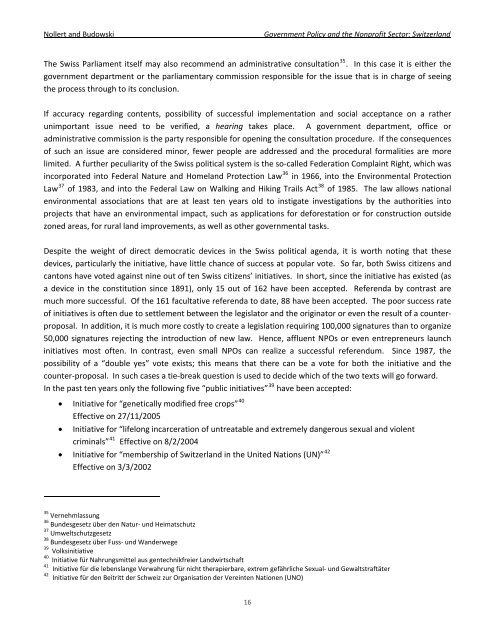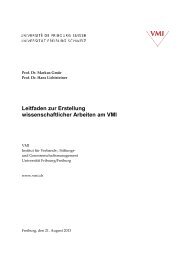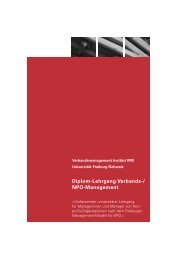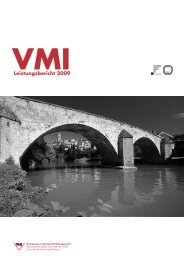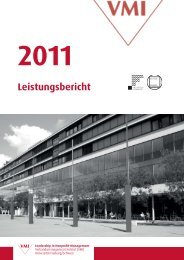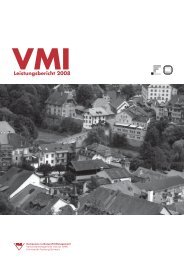Government Policy and the Nonprofit Sector: Switzerland - VMI
Government Policy and the Nonprofit Sector: Switzerland - VMI
Government Policy and the Nonprofit Sector: Switzerland - VMI
- TAGS
- nonprofit
- switzerland
- vmi.ch
Create successful ePaper yourself
Turn your PDF publications into a flip-book with our unique Google optimized e-Paper software.
Nollert <strong>and</strong> Budowski <strong>Government</strong> <strong>Policy</strong> <strong>and</strong> <strong>the</strong> <strong>Nonprofit</strong> <strong>Sector</strong>: Switzerl<strong>and</strong><br />
The Swiss Parliament itself may also recommend an administrative consultation 35 . In this case it is ei<strong>the</strong>r <strong>the</strong><br />
government department or <strong>the</strong> parliamentary commission responsible for <strong>the</strong> issue that is in charge of seeing<br />
<strong>the</strong> process through to its conclusion.<br />
If accuracy regarding contents, possibility of successful implementation <strong>and</strong> social acceptance on a ra<strong>the</strong>r<br />
unimportant issue need to be verified, a hearing takes place. A government department, office or<br />
administrative commission is <strong>the</strong> party responsible for opening <strong>the</strong> consultation procedure. If <strong>the</strong> consequences<br />
of such an issue are considered minor, fewer people are addressed <strong>and</strong> <strong>the</strong> procedural formalities are more<br />
limited. A fur<strong>the</strong>r peculiarity of <strong>the</strong> Swiss political system is <strong>the</strong> so‐called Federation Complaint Right, which was<br />
incorporated into Federal Nature <strong>and</strong> Homel<strong>and</strong> Protection Law 36 in 1966, into <strong>the</strong> Environmental Protection<br />
Law 37 of 1983, <strong>and</strong> into <strong>the</strong> Federal Law on Walking <strong>and</strong> Hiking Trails Act 38 of 1985. The law allows national<br />
environmental associations that are at least ten years old to instigate investigations by <strong>the</strong> authorities into<br />
projects that have an environmental impact, such as applications for deforestation or for construction outside<br />
zoned areas, for rural l<strong>and</strong> improvements, as well as o<strong>the</strong>r governmental tasks.<br />
Despite <strong>the</strong> weight of direct democratic devices in <strong>the</strong> Swiss political agenda, it is worth noting that <strong>the</strong>se<br />
devices, particularly <strong>the</strong> initiative, have little chance of success at popular vote. So far, both Swiss citizens <strong>and</strong><br />
cantons have voted against nine out of ten Swiss citizens’ initiatives. In short, since <strong>the</strong> initiative has existed (as<br />
a device in <strong>the</strong> constitution since 1891), only 15 out of 162 have been accepted. Referenda by contrast are<br />
much more successful. Of <strong>the</strong> 161 facultative referenda to date, 88 have been accepted. The poor success rate<br />
of initiatives is often due to settlement between <strong>the</strong> legislator <strong>and</strong> <strong>the</strong> originator or even <strong>the</strong> result of a counter‐<br />
proposal. In addition, it is much more costly to create a legislation requiring 100,000 signatures than to organize<br />
50,000 signatures rejecting <strong>the</strong> introduction of new law. Hence, affluent NPOs or even entrepreneurs launch<br />
initiatives most often. In contrast, even small NPOs can realize a successful referendum. Since 1987, <strong>the</strong><br />
possibility of a “double yes” vote exists; this means that <strong>the</strong>re can be a vote for both <strong>the</strong> initiative <strong>and</strong> <strong>the</strong><br />
counter‐proposal. In such cases a tie‐break question is used to decide which of <strong>the</strong> two texts will go forward.<br />
In <strong>the</strong> past ten years only <strong>the</strong> following five “public initiatives” 39 have been accepted:<br />
• Initiative for “genetically modified free crops” 40<br />
Effective on 27/11/2005<br />
• Initiative for “lifelong incarceration of untreatable <strong>and</strong> extremely dangerous sexual <strong>and</strong> violent<br />
criminals” 41 Effective on 8/2/2004<br />
• Initiative for “membership of Switzerl<strong>and</strong> in <strong>the</strong> United Nations (UN)” 42<br />
Effective on 3/3/2002<br />
35 Vernehmlassung<br />
36 Bundesgesetz über den Natur‐ und Heimatschutz<br />
37 Umweltschutzgesetz<br />
38 Bundesgesetz über Fuss‐ und W<strong>and</strong>erwege<br />
39 Volksinitiative<br />
40 Initiative für Nahrungsmittel aus gentechnikfreier L<strong>and</strong>wirtschaft<br />
41 Initiative für die lebenslange Verwahrung für nicht <strong>the</strong>rapierbare, extrem gefährliche Sexual‐ und Gewaltstraftäter<br />
42 Initiative für den Beitritt der Schweiz zur Organisation der Vereinten Nationen (UNO)<br />
16


